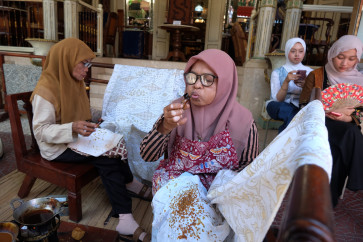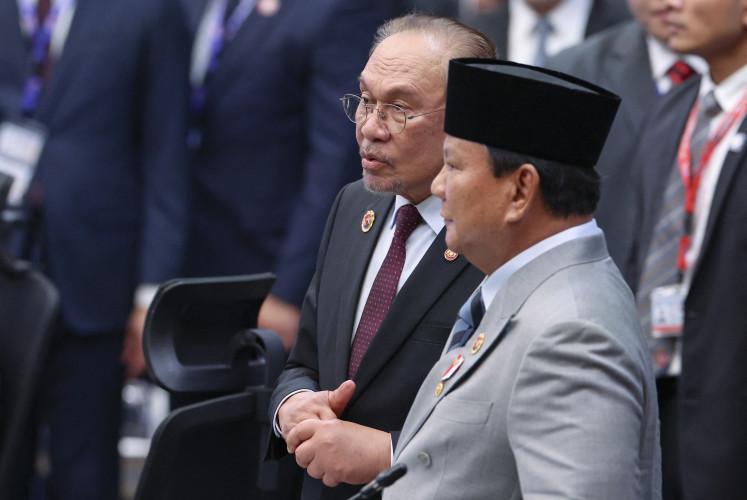Popular Reads
Top Results
Can't find what you're looking for?
View all search resultsPopular Reads
Top Results
Can't find what you're looking for?
View all search resultsCME Festival: Giving voice to women’s perspectives
Closing in style: Sylvia Saartje, an Indonesian rocker, sings an Aerosmith song at the closing of the Cipta Media Ekspresi Festival in Yogyakarta on April 28
Change text size
Gift Premium Articles
to Anyone
C
losing in style: Sylvia Saartje, an Indonesian rocker, sings an Aerosmith song at the closing of the Cipta Media Ekspresi Festival in Yogyakarta on April 28.(JP/Bambang Muryanto)
A recent festival presented a plethora of women’s perspectives on various issues that can sometimes be overlooked by the contemporary mainstream feminist movement.
Dozens of photos depicting the life of the Korowai ethnic group in the jungles of Papua graced the Yogyakarta Cultural Center (TBY) at the end of April. They showed a man carrying a little child while men and women worked on their farms or built khaim (tree houses) together.
Rhidian “Dian” Yasminta Wasaraka took the photos as part of research she began in 2013.
After delving into the survival of the group that is often stigmatized, Dian said Korowai women were very powerful and in a position to reject a marriage proposal, seek a divorce and choose to have a child or not.
In feminist language, the women uphold the principle of “my body is my authority”.
Dian has written about her research results in a book titled Perempuan Perkasa, Belajar Praktik Kesetaraan dalam Budaya Suku Korowai (Powerful Women, Practicing Equality in Korowai Ethnic Culture).
“The Korowai community has indirectly applied the protocol in the Convention of the Committee on the Elimination of Discrimination against Women [CEDAW],” said Dian, who is also a lecturer at the Muhammadiyah Communication Science College (STIKOM) in Jayapura, Papua.
Dian is a recipient of a grant from the United States-based Ford Foundation’s Cipta Media Ekspresi (CME) program, which encourages recipients to channel their expressions through various media in the form of research,
film or art.
Along with other fellow recipients, Dian appeared at the CME Festival: Etalase Pemikiran Perempuan (CME Festival: The Display of Women’s Reflections) at TBY from April 26 to 28, where they shared their experiences, refined their perspectives on feminism and expanded their networks for future projects.
One of the CME jurors and mentors, Intan Paramadhita, said the program was specifically designed for Indonesian women and aimed to encourage them and facilitate their creations for the improvement of their social
environments.
“Most women have rare opportunities for creative activities, as they have to take care of their families or only have a few friends,” said Intan, who is also a novelist.
According to Intan, the eight CME jurors had to work hard to select 40 out of the 1,168 proposals submitted. Those selected received grants for their works from a total fund of Rp 3.5 billion (US$243,000).
Among the other recipients were Chonie Prysilia and Hizkia Subiyantoro, who raised the issue of childless wives. In a patriarchal society this group of women faces pressure from their family circle, not to mention very conservative people, because women are burdened with the obligation to generate offspring.
Chonie said most people made their own conclusions and stereotypical judgments concerning married women without children. For proper balance, Chonie and Hizkia produced the animated documentary Kosong (Empty) to express the views of women who belong to this group.
“This film is meant for the public to listen to what these women think,” Chonie added.
Another recipient was Sri Harti, a wayang kulit (traditional Javanese shadow puppet) artist from Surakarta. In Sri’s work, she questions wayang kulit’s perpetuation of patriarchal culture through its narratives, which rarely highlight female figures and even often degrade women.
Sri created an alternative story called Wanita Kusumayudha (Heroine), which speaks in favor of a female character. The story contains dialogues that focus on expanding public perspectives of women to see them as equal
to men.
Not all recipients presented physically tangible works like those of Dian, Chonie, Hizkia and Sri during the festival.
One participant, 45-year-old Endah “Fitri” Fitriana, for example, made a “special” appearance without presenting any creation after having dedicated herself to teaching children to sing macapat (Javanese poetry songs) since 2011 in the Samin community, a tribal group that opposed Dutch-rule in the colonial era.
After demonstrating several macapat tunes with her students at the opening of the CME festival, Fitri said she became eager to teach Samin children because not many of them were previously interested in learning the songs, even though they often serve as an instrument for imparting the community’s noble principles, such as the importance of safeguarding their Kendeng Mountain region and environment from intrusive mining activities.
When Fitri started to teach the Samin children macapat, she faced many difficulties because the gamelan instruments used to accompany the songs were badly damaged. The CME then provided her with around Rp 340 million to buy a brand new set of the traditional musical instruments.
“The children were so happy to get the new gamelan that they play them very gently for fear of damaging them,” Fitri said.
Ignasius Kendal, a visitor to the festival, said the work of CME grant recipients like Dian, Chonie, Hizkia and Fitri were very impressive and helped him, as a man, become more aware of women’s issues.










